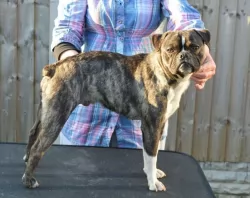 MyDogBreeds
MyDogBreeds Fruggle is originated from United States but Bichon Frise is originated from Spain. Fruggle may grow 6 cm / 3 inches higher than Bichon Frise. Both Fruggle and Bichon Frise are having almost same weight. Fruggle may live 4 years less than Bichon Frise. Both Fruggle and Bichon Frise has almost same litter size. Fruggle requires Moderate maintenance. But Bichon Frise requires Low maintenance
Fruggle is originated from United States but Bichon Frise is originated from Spain. Fruggle may grow 6 cm / 3 inches higher than Bichon Frise. Both Fruggle and Bichon Frise are having almost same weight. Fruggle may live 4 years less than Bichon Frise. Both Fruggle and Bichon Frise has almost same litter size. Fruggle requires Moderate maintenance. But Bichon Frise requires Low maintenance
 The Fruggle is a mixed breed/hybrid crossover between a Pug and a French Bulldog. The “Frug” is considered a designer breed, developed in the United States and growing in popularity. These hybrid dogs all can be different taking their looks and characteristics from one or both of the parent dogs in different ways. Within the same litter you can have pups that look like pugs and act like French Bulldogs or look like French Bulldogs and act like pugs.
The Fruggle is a mixed breed/hybrid crossover between a Pug and a French Bulldog. The “Frug” is considered a designer breed, developed in the United States and growing in popularity. These hybrid dogs all can be different taking their looks and characteristics from one or both of the parent dogs in different ways. Within the same litter you can have pups that look like pugs and act like French Bulldogs or look like French Bulldogs and act like pugs.
Also known as a Frenchie Pug, the hybrid is growing in popularity and new to the United Kingdom but recognized by the American Canine Hybrid Club. It is not recognized by the AKC or American Kennel Club. They are developed from purebred dogs but are not a purebred breed at this time. It would take generations of breeding true for that to happen. At the same time the Fruggle is an adorable little dog with characteristics of both its purebred parents.
The French Bulldog is a descendent of dogs that lived with ancient Greeks, the Molossians Phoenician traders spread the dog throughout the known world. These dogs were used in dogs fights and sporting until 1835 when these were outlawed. The Frenchie became a companion dog for the ladies of Paris, writers, artists and fashion designers. The Pug, on the other hand, can trace their history as far back as Confucius in 700BC. They are one of the most ancient dog breeds in existence today. They were the property of the Imperial Family in China, guarded by soldiers. Stealing a pug in Imperial China was punishable by death.
There is no real history or the Fruggle as it is too young in its existence as a separate type of dog. It is considered a breed – just a hybrid breed. In addition to the American Canine Hybrid Club, it is also recognized by the International Designer Canine Registry, the Designer Breed Registry, the Dog Registry of America and the Designer Dogs Kennel Club.
 Contrary to the myths and many of the tales of the history of the Bichon Frise, the breed was originally developed in Spain. Later specific trait development occurred in France to give us the lap dog Bichon Frise that we know today. The original Spanish dog – the Bichon – was a water – sailing dog. It was descended from the poodle breeds crossed with either the water spaniels or the Barbet. These early dogs were friendly and happy and because of this, sailors carried them with them on their ships and even bartered them for supplies. Prior to the 14th century the Spanish probably brought them to the Canary Islands. Later in the 14th century they we discovered again by Italian sailors who returned them to Europe where they lived in the courts of the nobility. During the Renaissance and after the French fell in love with the breed while the Spanish continue to enjoy their presence.
Contrary to the myths and many of the tales of the history of the Bichon Frise, the breed was originally developed in Spain. Later specific trait development occurred in France to give us the lap dog Bichon Frise that we know today. The original Spanish dog – the Bichon – was a water – sailing dog. It was descended from the poodle breeds crossed with either the water spaniels or the Barbet. These early dogs were friendly and happy and because of this, sailors carried them with them on their ships and even bartered them for supplies. Prior to the 14th century the Spanish probably brought them to the Canary Islands. Later in the 14th century they we discovered again by Italian sailors who returned them to Europe where they lived in the courts of the nobility. During the Renaissance and after the French fell in love with the breed while the Spanish continue to enjoy their presence.
In the late 19th century in France the breed fell out of popularity and became street dogs and circus and fair dogs. They also worked with organ grinders and assisted the blind. In the early 20th century, the Societe Centrale Canine, the National Kennel Club of France, adopted the breed’s official standard – while they were still known as both the Bichon and the Tenerife. The popularity of the breed at this time is heavily attributed to “The Adventures of TinTIn” , by Herge, which featured a small, white, fluffy fox terrier. Then the president of the Federation Cynoloqique Internationale presented a new name for the breed based on its characteristics. The name Bichon Frise kept the Bichon heritage and added “curly” the meaning of Frise. Under this name the breed was admitted to the Societe Centrale Canine stud book in October of 1934.
The Bichon Frise came to the United States for the first time in 19554 and was admitted to the American Kennel Club Stud Book in 1972. They entered the non-sporting group of the AKC in 1973. By 2001 the Bichon Frise, J.R., won the Westminster Dog Show. In 1976, the Bichon Frise came to Australia, imported by Harry and Margaret Begg who oversaw the growth of the breed there. Today there are 4 separate breeds believed to be descended from the original Bichon/Tenerife breeds – the Bichon Frise, the Bichon Bolognaise, the Maltese and the Havanese.
 Being a designer dog, the appearance and characteristics of the Fruggle varies from pup to pup. Most do have flat faces, large eyes, and short muzzles. The Frug is a short, sturdy and compact dog. Their tail is over the back in a tight curl, and the ears are round and large. They are called Rose Ears. The nose and eyes are black or very dark and they have wrinkles on the forehead. This is the basic generalization of a mix between the Pug and the French Bulldog. The reality is they are all different. Most often they have a Pugs face with the French Bulldogs ears. They are a little smaller than the French Bulldog and a little larger than the Pug. Their hair is fine, glossy, smooth and short.
Being a designer dog, the appearance and characteristics of the Fruggle varies from pup to pup. Most do have flat faces, large eyes, and short muzzles. The Frug is a short, sturdy and compact dog. Their tail is over the back in a tight curl, and the ears are round and large. They are called Rose Ears. The nose and eyes are black or very dark and they have wrinkles on the forehead. This is the basic generalization of a mix between the Pug and the French Bulldog. The reality is they are all different. Most often they have a Pugs face with the French Bulldogs ears. They are a little smaller than the French Bulldog and a little larger than the Pug. Their hair is fine, glossy, smooth and short.
 The modern Bichon Frise is a white, small dog with a round skull and muzzle. The nose should be black and the eyes round and dark. Depending on the size of the dog, the legs and head are proportionate to the body, while the tail should be curly and long. Both the tail and the ears must not be docked. Their coat is as hypoallergenic as a dog gets. It is white, dense and for most Bichon Frise, it is curly. They should have black lips as well.
The modern Bichon Frise is a white, small dog with a round skull and muzzle. The nose should be black and the eyes round and dark. Depending on the size of the dog, the legs and head are proportionate to the body, while the tail should be curly and long. Both the tail and the ears must not be docked. Their coat is as hypoallergenic as a dog gets. It is white, dense and for most Bichon Frise, it is curly. They should have black lips as well.
 The Fruggle is very child friendly
The Fruggle is very child friendly
The Fruggle is a good watchdog and can be taught many tricks.
He is not very adaptable. He can live in city and in apartments much better than in the country or on farms. He needs air conditioning
Is very high as the Fruggle is very intelligent
 The Bichon Frise, according to the American Kennel Club is a cheerful and merry dog. They are gentle, playful, sensitive and affectionate. These dogs love people, are very social and like other dogs as well. They love to play with children and they are intelligent and affectionate. They were developed in their latter stages by the French to be “lap dogs” or companion animals. They are not territorial by nature but can become so if confined and encouraged. Start obedience training early and be consistent throughout their lives. They take to training easily if positive techniques are used. They do however, have a reputation for not taking well to housetraining. Be persistent
The Bichon Frise, according to the American Kennel Club is a cheerful and merry dog. They are gentle, playful, sensitive and affectionate. These dogs love people, are very social and like other dogs as well. They love to play with children and they are intelligent and affectionate. They were developed in their latter stages by the French to be “lap dogs” or companion animals. They are not territorial by nature but can become so if confined and encouraged. Start obedience training early and be consistent throughout their lives. They take to training easily if positive techniques are used. They do however, have a reputation for not taking well to housetraining. Be persistent
 The Fruggle can inherit any of the health issues of either parent or they might be healthier than either parent. Some of the issues that the Fruggle might face include:
The Fruggle can inherit any of the health issues of either parent or they might be healthier than either parent. Some of the issues that the Fruggle might face include:
 The coat of the Bichon Frise can easily become matted if not brushed or combed every day. Severe matting can lead to a hematoma in their ears. They are also very prone to ear infections so paying a lot of attention to their ears is imperative. They are will chew and scratch themselves if not groomed well and this can cause skin infections and conditions. They might have allergies to fleas, pollen, chemicals, and dust. The patella (knee cap) can be loose, diabetes, cataracts and heart disease also affect the Bichon Frise. In the United Kingdom the number one cause of death for the breed is old age -13 plus years, with 21% dying of cancer. In North America cancer is the number one killer as it is for most dogs. The Bichon might also be afflicted with hematologic disorders such as AIHA (Autoimmune hemolytic anemia) and ITP (Immune-mediated thrombocytopenia) which while less common than cancer will kill the dog much earlier in life than cancer. The other condition that the Bichon Frise is prone to are liver shunts. If found early they can be surgically corrected but most are not, and liver failure is eventually the cause of death.
The coat of the Bichon Frise can easily become matted if not brushed or combed every day. Severe matting can lead to a hematoma in their ears. They are also very prone to ear infections so paying a lot of attention to their ears is imperative. They are will chew and scratch themselves if not groomed well and this can cause skin infections and conditions. They might have allergies to fleas, pollen, chemicals, and dust. The patella (knee cap) can be loose, diabetes, cataracts and heart disease also affect the Bichon Frise. In the United Kingdom the number one cause of death for the breed is old age -13 plus years, with 21% dying of cancer. In North America cancer is the number one killer as it is for most dogs. The Bichon might also be afflicted with hematologic disorders such as AIHA (Autoimmune hemolytic anemia) and ITP (Immune-mediated thrombocytopenia) which while less common than cancer will kill the dog much earlier in life than cancer. The other condition that the Bichon Frise is prone to are liver shunts. If found early they can be surgically corrected but most are not, and liver failure is eventually the cause of death.
 1/2 cup should be fed daily in two to three meals of high quality dry puppy food
1/2 cup should be fed daily in two to three meals of high quality dry puppy food
1/2 to 2 cups should be fed daily in two meals of high quality dry adult food
Quite often the first generation hybrid has much better health than either of the founding breeds. The same is not true of the second and third generations.
The Fruggle is a laid back dog requiring very little exercise. A daily walk or rolling a ball around the apartment is enough for him. The Fruggle should NOT be exercise vigorously or excessively due to its smashed face and Brachycephalic Syndrome. Weekly visits to a dog park would be sufficient as well. Do not take him out in excessive cold or heat.
 Being a small dog, the Bichon Frise is susceptible to obesity and that condition will be terminal in the end for this breed. So make sure you do not overfeed your Bichon Frise. The same is true with the use of treats. The Bichon loves treats and loves the association with treats of having pleased you. They should be fed small meals – about ¼ cup of good high quality dry food twice a day.
Being a small dog, the Bichon Frise is susceptible to obesity and that condition will be terminal in the end for this breed. So make sure you do not overfeed your Bichon Frise. The same is true with the use of treats. The Bichon loves treats and loves the association with treats of having pleased you. They should be fed small meals – about ¼ cup of good high quality dry food twice a day.
As previously mentioned the Bichon Frise is susceptible to:
Hematomas and infections of the ear if not groomed well and consistently.
Cancer is number one killer.
Hematological Issues are deadlier than cancer.
Liver shunts are a very serious concern.
Though the Bichon Frise is not an overly active dog, they do love to play. They are characterized by short bursts of activity followed by long periods of rest. They can be worn out just by running around the house. You must play with them everyday as well as take them on a walk each day. Bichons are fast and agile and do well in agility trials. They also like to compete in rally and obedience trials. Most of all they love to and need to play with their people every day.